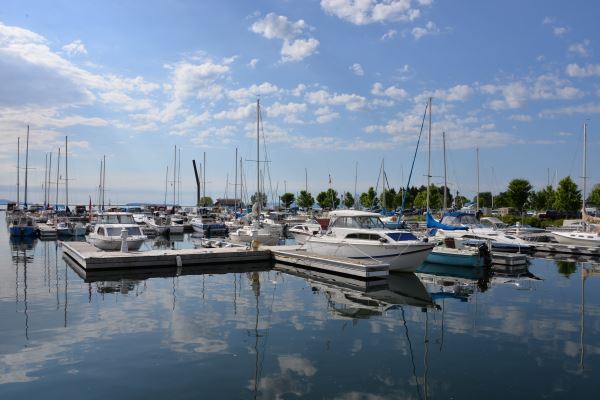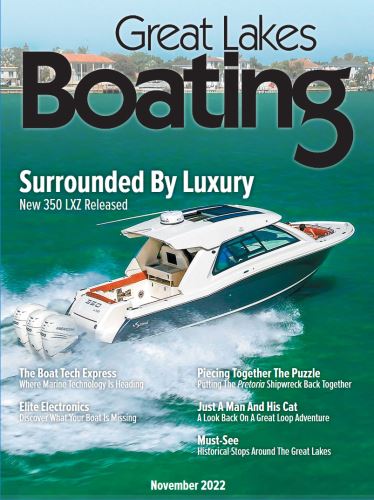
Dr. Steven Beckham, an inventor from Cortez, Florida, has created an environmentally friendly way to control barnacle and zebra and quagga mussel growth on underwater structures such as boat hulls, running gear and crab traps. Barnacle Stop is an EPA-registered product that controls barnacles, zebra mussels and quagga mussels, and is now available at the Barnacle Stop website.
The idea was conceived in 2012 when Dr. Steven Beckham, founder of the company, grew tired of having to clean barnacles from the props and rudders of his 36-foot Prairie Trawler. Following lengthy experimentation with pharmaceutical grade capsaicin in varying strengths, dispersed in different proprietary inert application/carrying materials, Barnacle Stop was finally developed.
“Barnacle Stop works by preventing the attachment of the barnacles’ and mussels’ byssal thread,” Beckham said. “This is a proteinaceous thread, similar to a spiderweb, that the invertebrates make for attachment. It is believed that the barnacles and mussels find the active ingredient in Barnacle Stop irritating and avoid attaching to treated surfaces.”
Barnacle Stop can be applied two ways. Underwater, it is applied as a crayon to cleaned surfaces like soaping a window. Out of the water, it can either be melted in a slow cooker and painted on or applied like a crayon. Since Barnacle Stop doesn’t kill anything, the surfaces must be clean.
The active ingredient, capsaicin, is a natural extract from chili peppers. Barnacle Stop is composed of pharmaceutical grade capsaicin in a proprietary blend of natural waxes to produce a water insoluble product. The blend is patent pending.
A common way to prevent barnacles from vessels is to introduce a poisonous substance into the bottom paint mix. The poison is slowly released from the paint to deter invaders, but this can have negative effects on other marine life and ecosystems.
Barnacle Stop is essentially water insoluble. According to the inventor, this property makes it friendly to the environment and safe to apply when used according to label directions; it is about as dangerous as a jalapeno popper. It targets pests with no overkill.
To confirm safety and effectiveness, Beckham came to Mote Marine Laboratory — an independent, nonprofit, marine science institution — to use it as one of the laboratories testing the product. Mote Marine Laboratory endorses Barnacle Stop.
Beginning in 2013 and continuing to the present, Mote tested Barnacle Stop to prevent barnacles on underwater structures such as boat hulls, running gear and crab traps in Sarasota Bay, Florida. Testing was conducted by lowering three plastic apparatuses into Sarasota Bay. One apparatus was left untreated, one contained only the wax portion of the product without the active ingredient and one contained the product with the active ingredient. The apparatus with the active ingredient performed better than the other two. Results were determined by photographic analysis of the deployed plates.
Mote also performed the chemistry tests essential for EPA registration, including tests for efficacy and for the amount of active ingredient that is needed in the product.
Now that the product is in commercial production, Mote’s Ecotoxicology Research Program will continue to provide quality control for each batch of product produced. Barnacle Blocker will donate three percent of the gross sales from the product to Mote.
Toxicity tests were performed by an EPA certified lab (Marinco Bioassay Laboratory) to show that Barnacle Stop does not harm marine or freshwater fish or invertebrates.
Aside from Mote’s research, beginning in 2016, Barnacle Stop is being tested in lakes in Arizona, Michigan, Indiana, New York and Minnesota for controlling zebra mussels. There are also ongoing tests in Lake Mead and Lake Powell under National Park Service research permits for the control of quagga mussels. In Pine Lake, La Porte, Indiana, untreated test coupons averaged 80 percent infestation coverage. Plastic coupons treated with Barnacle Stop had zero percent infestation. In Lake Mead, after one year in the water untreated, coupons averaged 86 percent infestation coverage. Barnacle Stop-treated coupons had zero percent infestation.
Barnacle Stop is registered for use in Arizona, Florida, Indiana, Minnesota, Nevada, New York, Ohio, Tennessee and Utah. Registration is pending in California. Other states will be added as demand increases.
For More Information:
www.barnaclestop.com
www.mote.org

